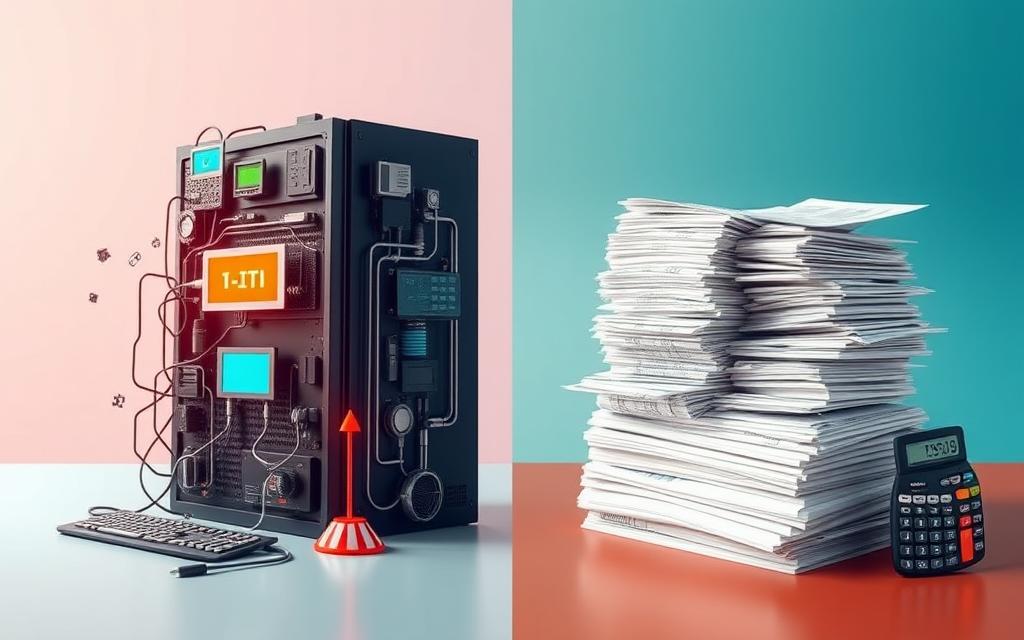Comparing Difficulty: Information Technology vs. Accounting
The debate over Information Technology and Accounting difficulty is complex. Each field offers unique academic and career challenges. It’s vital for students to grasp the intensity of each subject. This helps them make well-informed decisions about their future.
Recently, technology’s role in accounting has grown, showing the value of expertise in both fields. Adapting to job market changes is crucial for success. Also, breakthroughs in advanced technology greatly affect both areas. This sparks a deeper look into their challenges and rewards.
Introduction to the Fields of Study
Let’s explore two key areas: Information Technology and Accounting. They come with their own set of challenges and offerings. They’re suited for different kinds of talents and passions. This summary will look into what makes these fields important today, especially in business.
Overview of Information Technology
Information Technology is fast-paced and always changing. It focuses on computers, software, networks, and handling data. It has areas like Management Information Systems (MIS). About half of the students find software engineering tough, showing it’s a demanding area. Yet, there’s a huge need for IT experts in the US – a million jobs are waiting to be filled. The shift to tech-focused industries means lots of job chances, but it’s also competitive.
Overview of Accounting
Accounting is seen as crucial for keeping financial records, doing taxes, and auditing. A lot of students, around 60%, enjoy business studies, especially accounting. It needs a lot of memory work and attention to details, making it tough for some. But, getting an accounting degree is essential for doing the job right. It involves analyzing complex financial data. This could lead to different careers in finance, like auditing or forensic accounting. Study groups and advice from teachers can help a lot. For more on accounting challenges, check out this resource.
Importance in Modern Business
Accounting and Information Technology are crucial in business. Accounting ensures stability, legal compliance, and accurate financial records. IT, on the other hand, brings innovation and makes companies run smoother. They work together, needing pros who understand finances and can use tech smartly. As business grows more complex, combining accounting and tech skills will be key.
Key Differences in Academic Requirements
The world of Information Technology (IT) and Accounting stands quite apart in terms of what students study and how they are tested. Knowing these key differences helps students choose the right path for themselves.
Course Structure and Curriculum
Accounting students dive deep into financial practices, taxes, and how to conduct audits. They need to remember many rules and standards, showing the field’s highly organized nature. IT studies, on the other hand, are all about coding, analyzing systems, and managing databases. This leans more towards hands-on work and applying tech skills in real situations, rather than just memorizing facts.
Assessment Methods and Evaluation
When it comes to testing what you’ve learned, accounting focuses on exams and practical projects. These tests ensure students understand complex financial concepts deeply. IT students, however, face a mix of theory and practice exams to bring out their problem-solving abilities. These different ways of assessment highlight the unique requirements of each field, helping prepare students for what’s ahead in their careers.
Is Information Technology Harder Than Accounting?
The discussion on whether Information Technology (IT) or Accounting is tougher keeps going on. People often form their opinions based on personal experience. Some think Accounting is harder due to its strict structure and heavy study load. However, both areas have their unique hurdles. Getting to know their specific needs can help understand their differences.
Comparison of Difficulty Levels
Comparing the two, each requires different skills. Accounting students need to remember a lot of rules, standards, and financial ideas. Remembering this information is key to understanding financial reports and rules.
IT students, on the other hand, focus more on problem-solving. They work out technical issues and use creative thinking for tough problems. So, what’s hard in Accounting might be easier in IT for some students.
Memorisation versus Analytical Skills
Accounting demands a lot of memory work. There’s a huge amount of rules and standards to know. Accountants need this information to be precise and follow laws in their work. This need for memorisation might not suit students who like learning through doing.
However, IT values thinking skills and being able to adapt. IT students often tackle hands-on problems. They also need to know about data analytics, which is becoming important in IT and Accounting. This shows how these fields are evolving.

Job Market Insights and Career Opportunities
Accounting and information technology offer unique job insights and opportunities. Knowing about job trends, chances, and pay in these areas helps people choose wisely.
Employment Trends in Accounting
Accounting jobs are in high demand. Even with some jobs going overseas, the field is stable. There’s a big need for accountants, leading to a gap in supply and demand. Getting a CPA title is more important than ever, sometimes needing a master’s degree.
Opportunities in Information Technology
The IT world is full of exciting chances thanks to fast changes. Jobs are there, but it’s competitive, especially for those with specific degrees. This field is key for businesses that want to grow with new tech. To succeed, keeping up with technology changes is crucial.
Salary Expectations and Job Security
In accounting, starting pay is good and rising thanks to investment in people and tech. Firms like EY are investing more, which boosts pay for new professionals.
IT professionals earn more as they gain experience. But, job security can change fast with new tech trends. Compared to accounting, IT often pays more, but with less job steadiness. The table below shows pay and job security differences.
| Field | Starting Salary Growth | Average Starting Salary | Job Security |
|---|---|---|---|
| Accounting | 30% Rise (post-pandemic) | Lower than peers (16% increase 2017-2022) | Stable |
| Information Technology | Higher Growth (20% to 26% in certain majors) | Higher than accounting | Volatile |
Conclusion
Choosing a career in Information Technology or Accounting depends on your interests and goals. Each has its benefits and challenges. For example, accounting offers stability, while IT is known for innovation and change. This knowledge is key in making the right educational choice.
Consider if you like working with numbers or solving problems with technology. Practical experiences, like a home IT lab or accounting projects, are very helpful. Recent stats show a decrease in accounting students, highlighting changing trends.
Information Technology and Accounting can lead to fulfilling careers. It’s important to align your strengths with the field’s requirements. As these areas grow, making strategic choices is vital for success. For insights into how technology affects careers, check out this resource.
FAQ
What are the main differences between Information Technology and Accounting studies?
Information Technology deals with computer systems and managing data. Accounting focuses on financial matters, like taxes and auditing. These areas require different skills.
Which field is generally considered harder, Information Technology or Accounting?
This depends on the student. Accounting needs a lot of memorisation. Information Technology requires problem-solving skills. What’s hard varies from person to person.
What are the employment trends for graduates in these fields?
Accountants often find stable jobs, though some work gets outsourced. IT has many roles but faces intense competition and job security issues due to new technologies.
How do salary expectations compare between career paths in IT and Accounting?
Accounting offers steady starting pays and growth potential. IT jobs may pay more initially but come with industry volatility affecting job stability.
What skills are essential for success in Information Technology and Accounting?
Accounting success needs good memorisation and detail focus. Information Technology values analytical skills, programming, and problem-solving. Choose based on your strengths and interests.
What type of curriculum can students expect in Accounting and Information Technology courses?
Accounting courses cover finance, taxation, and auditing, with a focus on learning regulations. IT courses include programming, systems analysis, and database management, emphasising practical skills.









